Lemon Pound Cake
This post may contain affiliate links. Read my full disclosure policy.
This lemon pound cake is the ultimate dessert for lemon lovers.
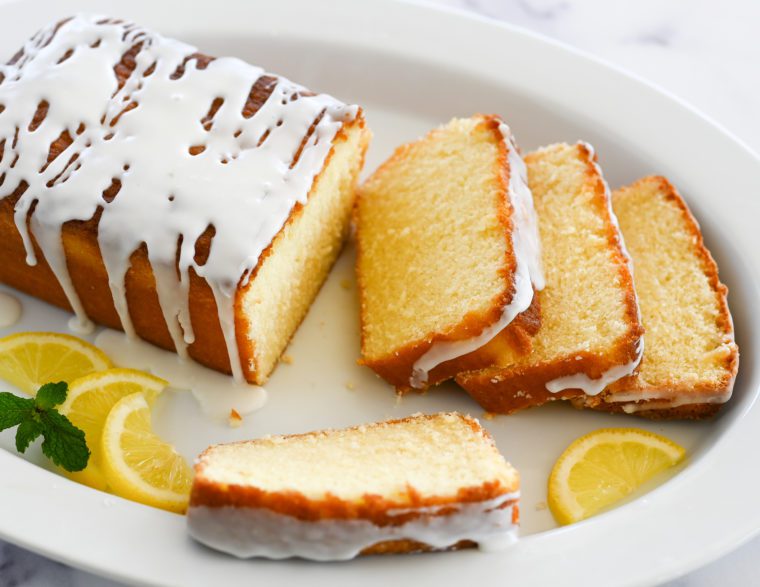
Calling all lemon lovers! This lemon pound cake is a dessert made just for you. The recipe incorporates both lemon zest and lemon juice into the cake batter, infusing the cake with a lovely lemon flavor. But the real magic happens after baking — the cake is generously doused with lemon syrup and then drizzled with a tart lemon glaze, delivering an intense burst of lemon flavor with every bite. The recipe yields two ultra-moist loaves that stay fresh for days on the countertop or can be frozen for later. If you’d like to switch things up, try my popular lemon poppyseed cake and lemon blueberry pound cake variations. A big thank you and shoutout to Karen Tannenbaum, one of my longtime readers, for inspiring this wonderful recipe!
What You’ll Need To Make Lemon Pound Cake
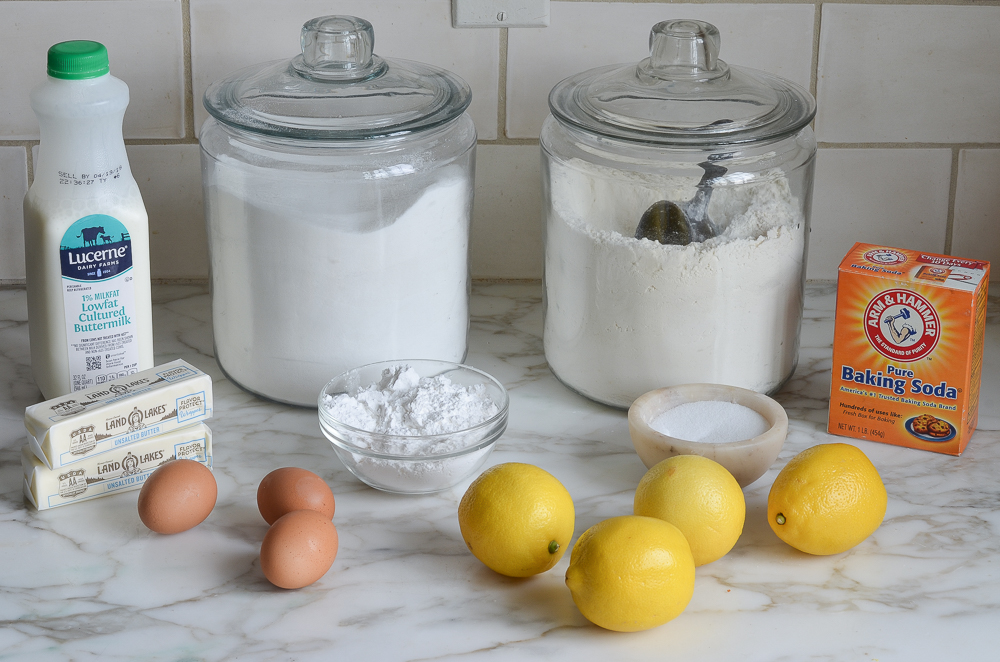
STEP-BY-STEP INSTRUCTIONS
Start by zesting and juicing your lemons. And be sure you zest the lemons first, otherwise, it will be impossible once they are juiced. The best tool for zesting is a rasp grater but any fine grater will do.
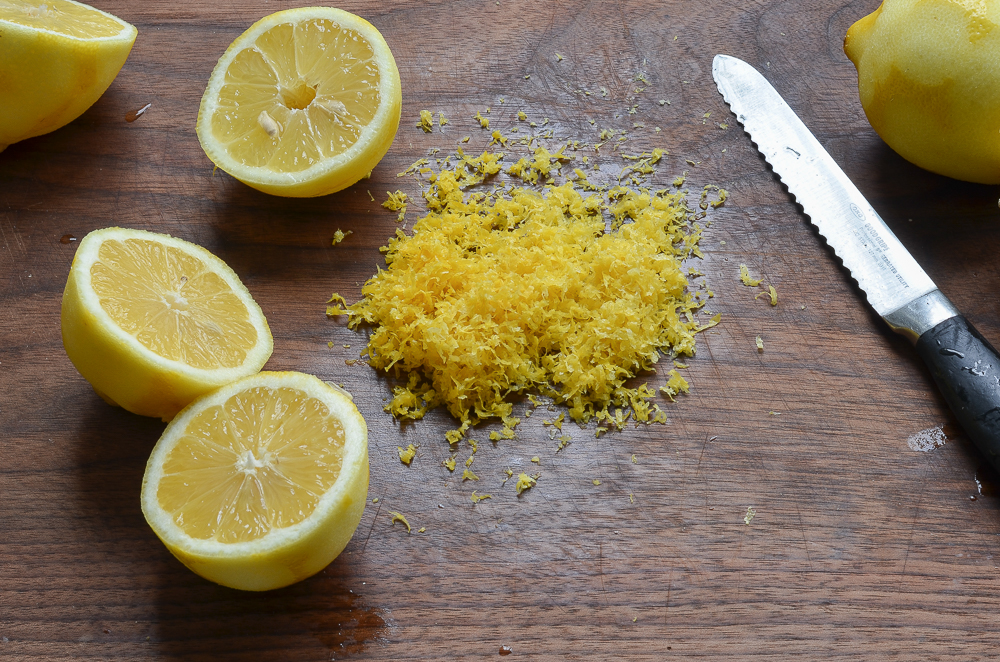 Combine the flour, salt, and baking soda in a mixing bowl. I always add dry ingredients in little piles so I don’t forget what I’ve already added.
Combine the flour, salt, and baking soda in a mixing bowl. I always add dry ingredients in little piles so I don’t forget what I’ve already added.
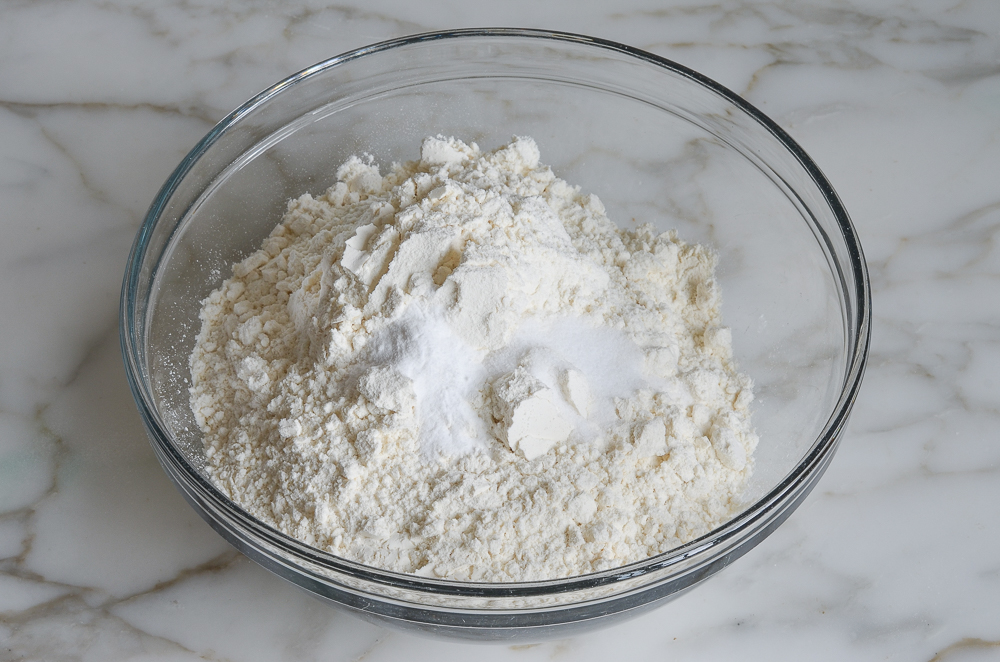 Whisk and set aside.
Whisk and set aside.
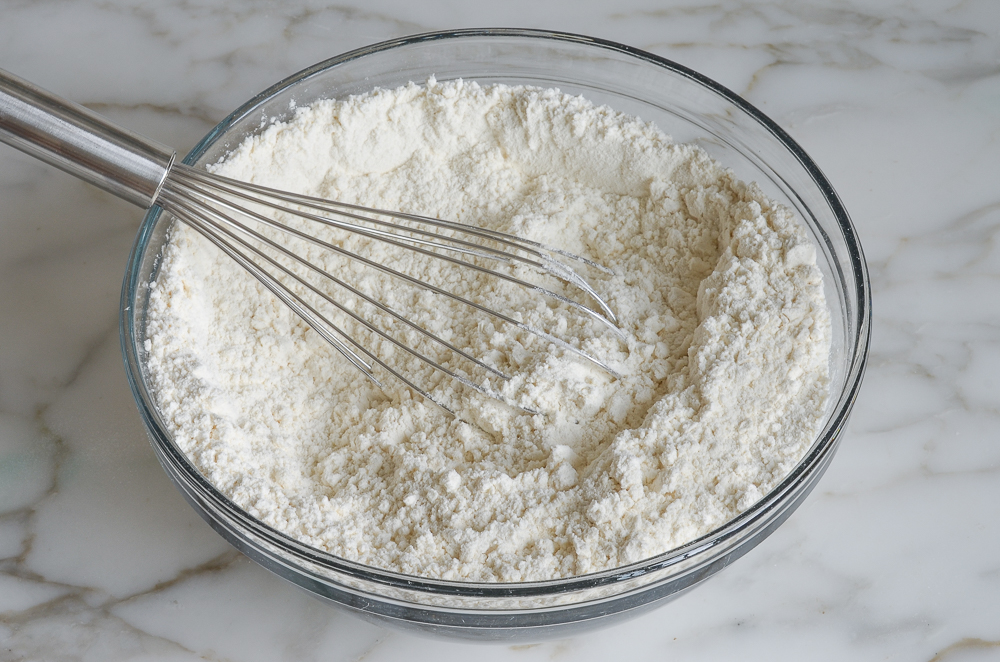
In another bowl, whisk together the buttermilk, lemon zest, and lemon juice. Set aside.
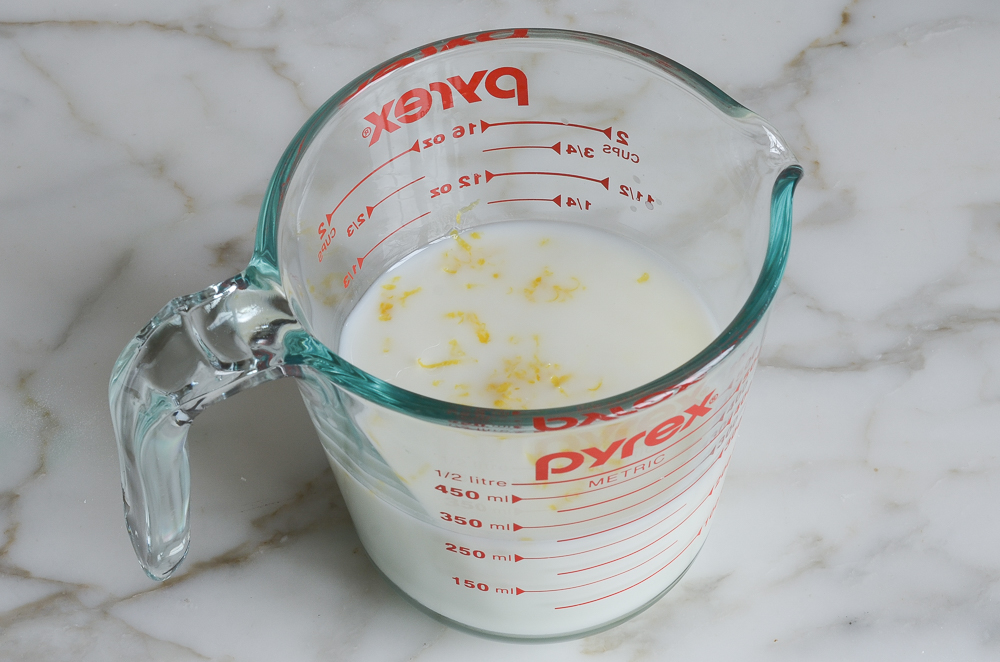
In the bowl of an electric mixer fitted with the paddle attachment (or beaters), cream the butter and sugar on medium speed until light and fluffy, 3 to 4 minutes.
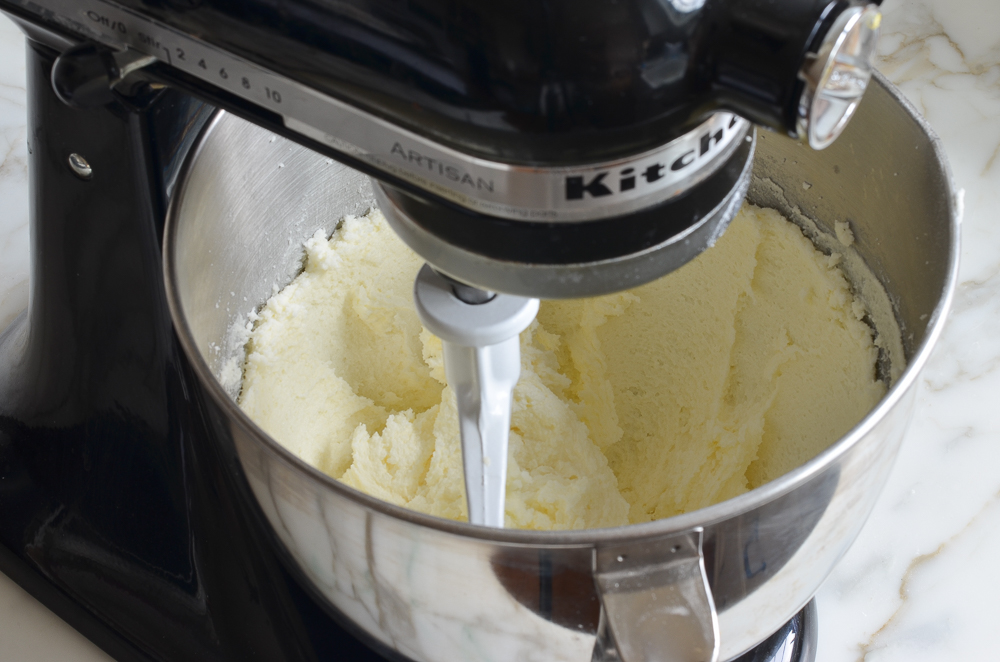
Scrape down the sides of the bowl, then beat in the eggs one at a time, beating well after each addition. Scrape down the sides of the bowl again.
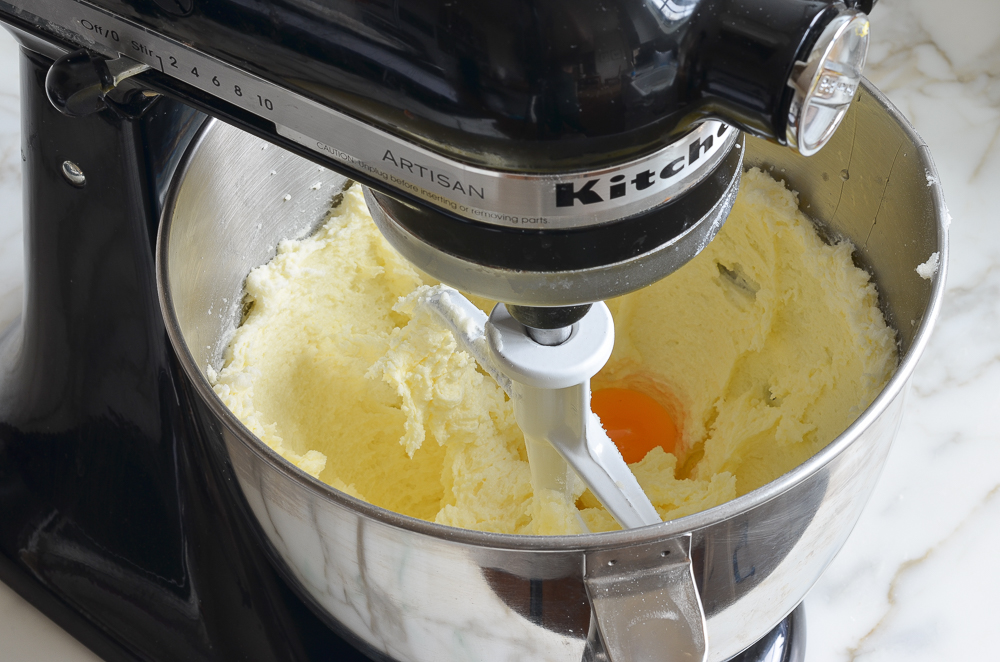
With the mixer on low speed, beat in one-quarter of the flour mixture, then one-third of the buttermilk mixture. Beat in another quarter of the flour, then another third of the buttermilk mixture. Repeat with another quarter of the flour and the remaining buttermilk mixture. Finally, beat in the remaining flour mixture.
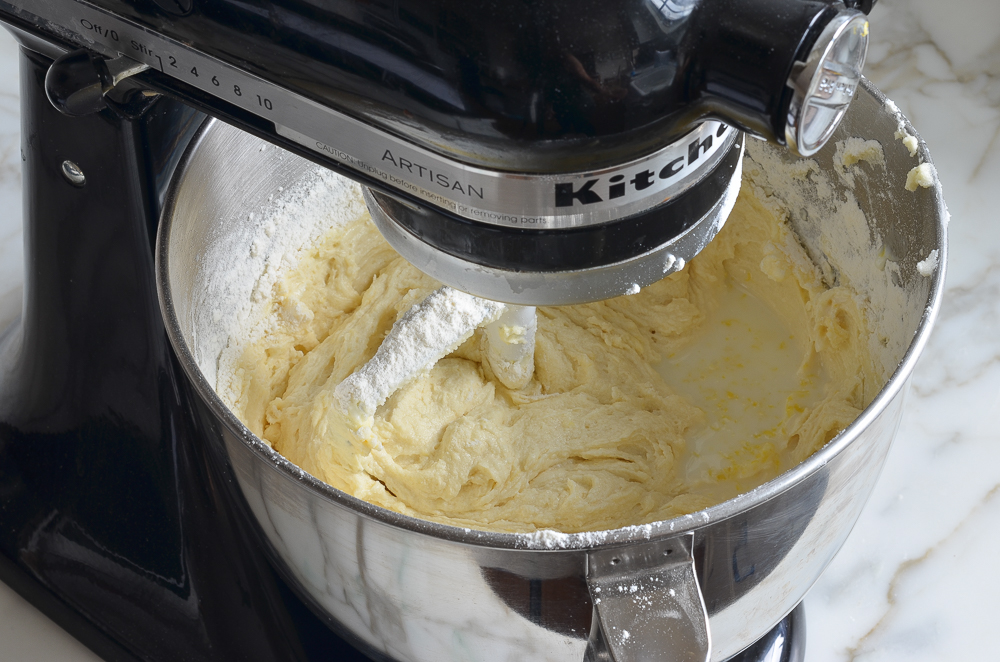
Scrape down the sides of the bowl, and give a quick mix to make sure all of the ingredients are well-incorporated.
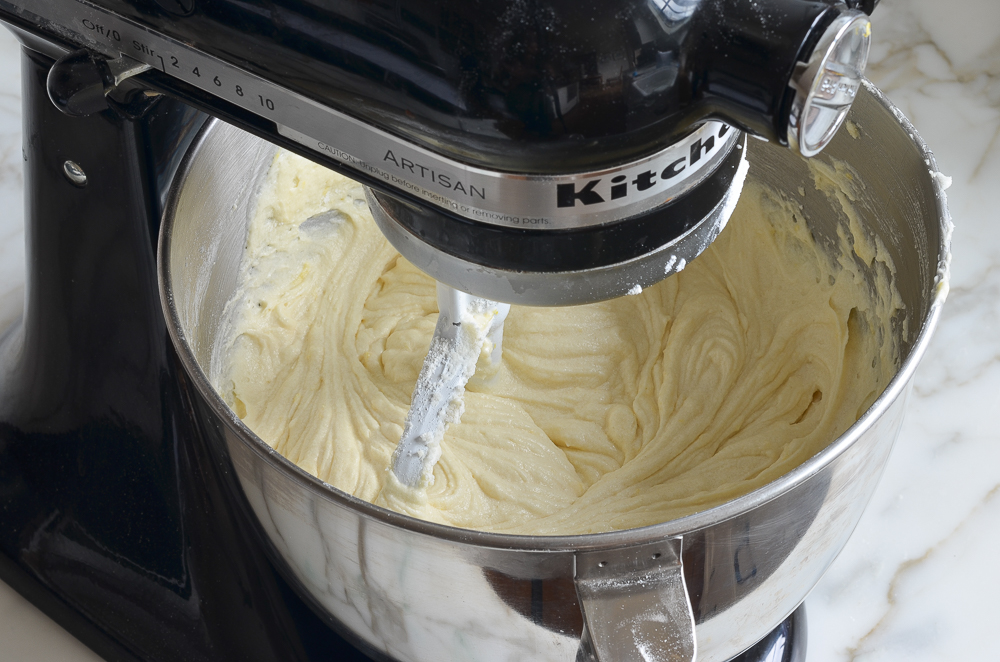
Transfer the cake batter to the prepared pans and smooth with a rubber spatula.
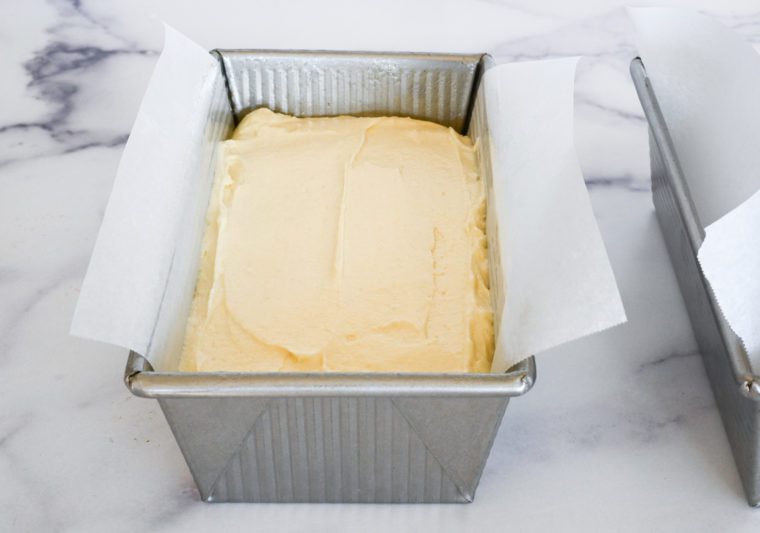
Bake for 55 to 65 minutes, or until the top is golden and a tester comes out clean.
Set the cakes on a cooling rack, and cool in the pans for 10 minutes.
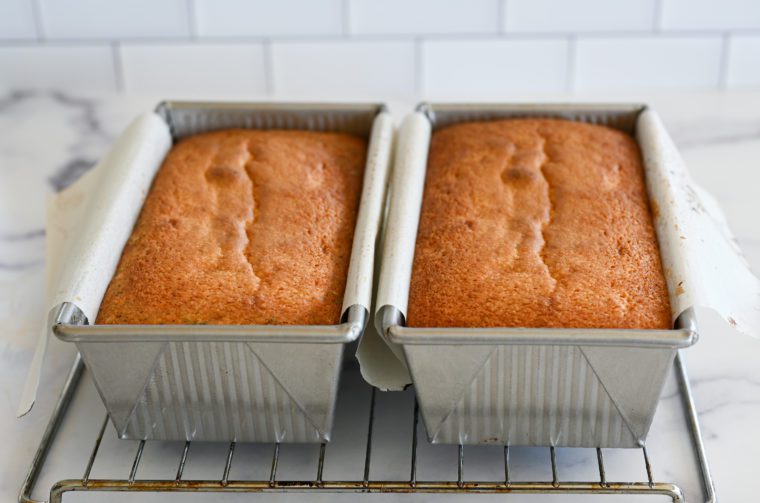
Carefully run a knife along the unlined sides of the pans to loosen the cake from the pan. Using the parchment slings, lift the cakes out of the pans and place onto the rack, leaving the parchment paper in place under the cakes. Let cool for about 1 hour.
When the cakes are almost cool, make the syrup. Combine the water and sugar in a saucepan and bring to a boil. Remove from the heat and stir in the lemon juice.
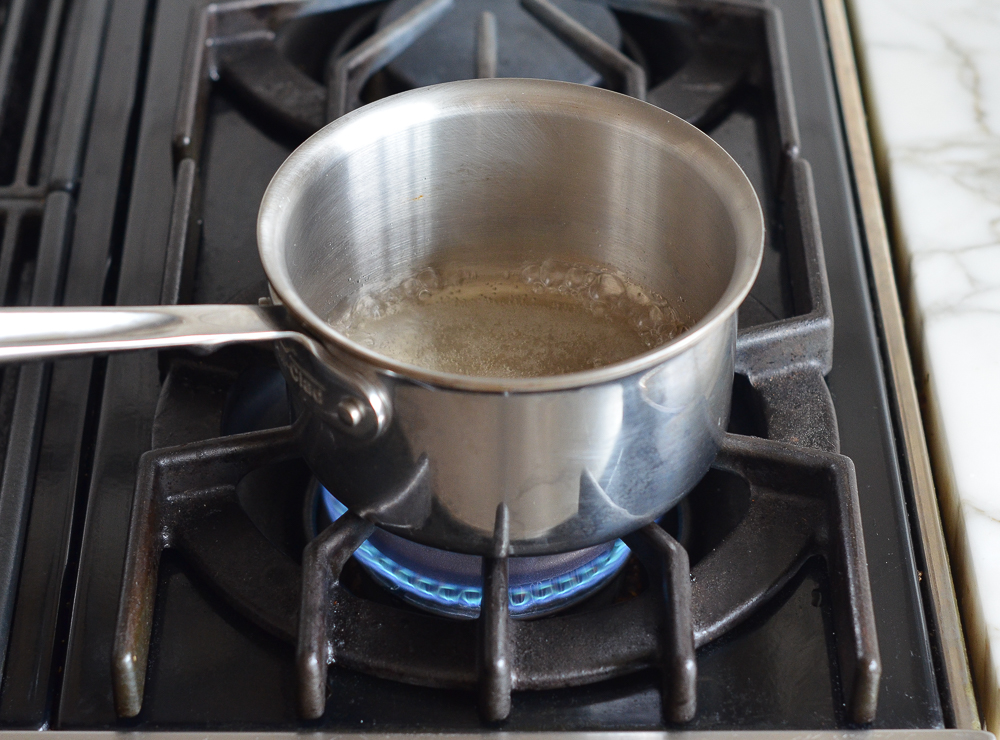
To make the glaze: in a medium bowl, whisk together the confectioners’ sugar and lemon juice. Add more confectioners’ sugar or lemon juice as necessary to make a thick but pourable glaze (it should be a little thicker than you’d think, about the consistency of molasses or honey).
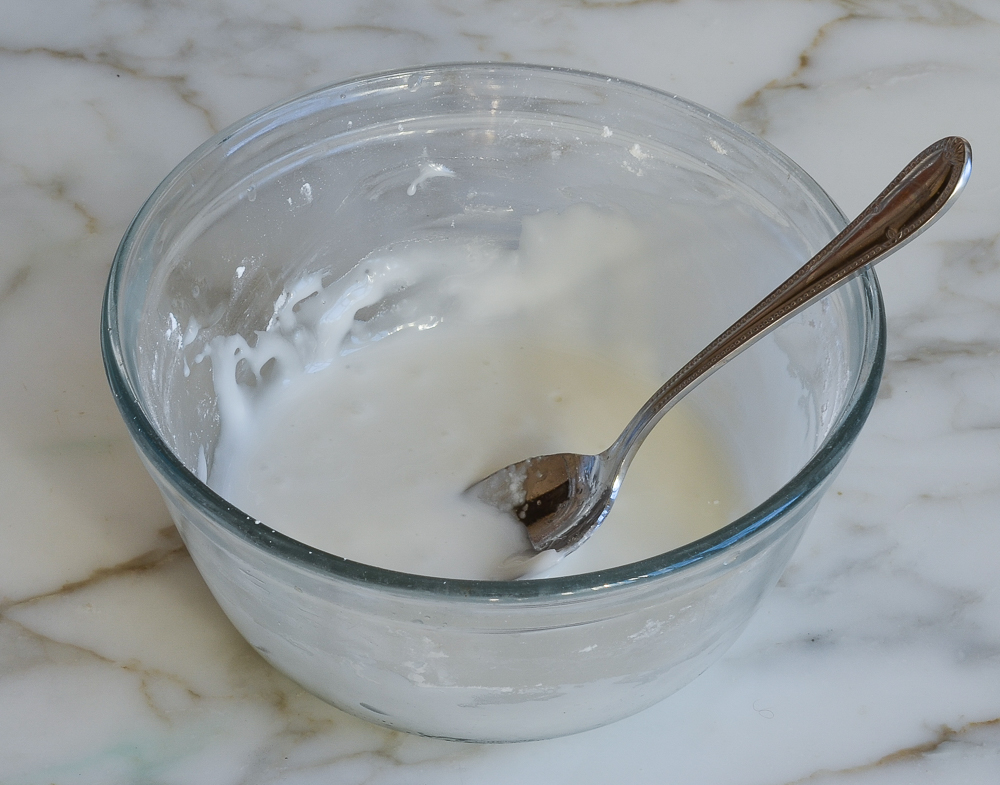
When the cakes are cool, carefully transfer them to serving platters. Gradually brush the warm syrup all over the cakes, including the sides, letting it soak in as you go.
Finally, spoon the glaze over the top of the cake, letting it drip down the sides.
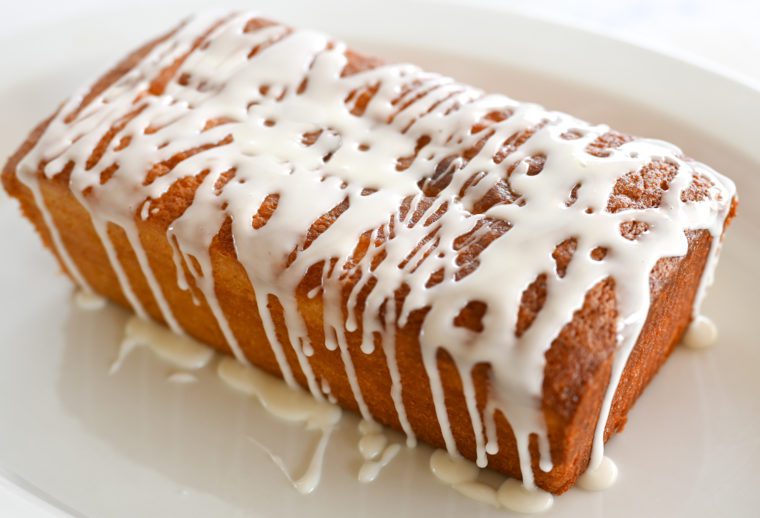
Let the cakes sit for about one hour to allow the glaze to set before serving.
How To Freeze Lemon Pound Cake
The cakes can be frozen without the glaze for up to 3 months. After they are completely cooled, double-wrap them securely with aluminum foil or plastic freezer wrap, or place them in a heavy-duty freezer bag. Thaw overnight on the countertop before serving. (Add the syrup before the cake is frozen and add the glaze after the cake is thawed.)
Note: This recipe was updated in 2022; to see the original version, click here.

You May Also Like
- Warm Lemon Pudding Cakes
- Lemon Poppy Seed Muffins
- Lemon Bars
- Cake Pans to Cookie Sheets: 16 Essential Baking Pans
Lemon Pound Cake
This lemon pound cake is the ultimate dessert for lemon lovers.
Ingredients
For the Cake
- 3 cups all-purpose flour, spooned into measuring cup and leveled-off with a knife
- ½ teaspoon baking soda
- ½ teaspoon salt
- 1 cup buttermilk (low-fat is fine) (see note)
- 2 tablespoons (packed) grated lemon zest (see note)
- 2 tablespoons fresh lemon juice
- 2 sticks (1 cup) unsalted butter, softened
- 2¼ cups granulated sugar
- 3 large eggs
For the Syrup
- 2 tablespoons water
- 2 tablespoons granulated sugar
- 2 teaspoons fresh lemon juice
For the Glaze
- 1 cup confectioners' sugar
- 2 tablespoons fresh lemon juice
Instructions
- Preheat the oven to 350°F and set an oven rack in the middle position. Spray two 8½ x 4½-inch loaf pans with nonstick cooking spray. Line the long sides of the pans with parchment paper “slings” and spray lightly with nonstick cooking spray again.
- In a medium bowl, whisk together the flour, baking soda and salt. Set aside.
- In another bowl, whisk together the buttermilk, lemon zest and lemon juice. Set aside.
- In the bowl of an electric mixer fitted with the paddle attachment (or beaters), cream the butter and sugar on medium speed until light and fluffy, 3 to 4 minutes. Scrape down the sides of the bowl, then beat in the eggs one at a time, beating well after each addition. Scrape down the sides of the bowl again.
- With the mixer on low speed, beat in one-quarter of the flour mixture, then one-third of the buttermilk mixture. Beat in another quarter of the flour, then another third of the buttermilk mixture. Repeat with another quarter of the flour and the remaining buttermilk mixture. Finally, beat in the remaining flour mixture. Scrape down the sides of the bowl, and give a quick mix to make sure all of the ingredients are well-incorporated.
- Divide the thick batter into the prepared pans and smooth with a rubber spatula. Bake for 55 to 65 minutes, or until the top is golden and a tester comes out clean.
- Set the cakes on a cooling rack, and cool in the pans for 10 minutes. Carefully run a knife along the unlined sides of the pans to loosen the cake from the pan. Using the parchment slings, lift the cakes out of the pans and place onto the rack, leaving the parchment paper in place under the cakes. Let cool for about 1 hour.
- When the cakes are almost cool, make the syrup. Combine the water and sugar in a saucepan and bring to a boil. Remove from the heat and stir in the lemon juice.
- When the cakes are cool, carefully transfer them to serving platters.
- Gradually brush the warm syrup all over the cakes, including the sides, letting it soak in as you go.
- To make the glaze: in a medium bowl, whisk together the confectioners' sugar and lemon juice. Add more confectioners' sugar or lemon juice as necessary to make a thick but pourable glaze (it should be a little thicker than you'd think, about the consistency of molasses or honey). Spoon the glaze over the top of the cake, letting it drip down the sides. Let the cakes sit for about one hour to allow the glaze to set before serving.
- Note: If you’d like to make your own buttermilk, check out the easy method here.
- Note: You'll need 4 to 5 large lemons for the entire recipe.
- Make-Ahead/Freezer-Friendly Instructions: The cakes can be made up to 1 day ahead of time and stored in a cake dome or airtight container at room temperature. They can also be frozen (without the final glaze) for up to 3 months. After they are completely cooled, double-wrap securely with aluminum foil or plastic freezer wrap, or place them in a heavy-duty freezer bag. Thaw overnight on the countertop before serving. (Add the syrup before the cake is frozen and add the glaze after the cake is thawed.)
Nutrition Information
Powered by ![]()
- Per serving (16 servings)
- Serving size: 1 slice
- Calories: 313
- Fat: 7g
- Saturated fat: 4g
- Carbohydrates: 59g
- Sugar: 40g
- Fiber: 1g
- Protein: 4g
- Sodium: 143mg
- Cholesterol: 51mg
This website is written and produced for informational purposes only. I am not a certified nutritionist and the nutritional data on this site has not been evaluated or approved by a nutritionist or the Food and Drug Administration. Nutritional information is offered as a courtesy and should not be construed as a guarantee. The data is calculated through an online nutritional calculator, Edamam.com. Although I do my best to provide accurate nutritional information, these figures should be considered estimates only. Varying factors such as product types or brands purchased, natural fluctuations in fresh produce, and the way ingredients are processed change the effective nutritional information in any given recipe. Furthermore, different online calculators provide different results depending on their own nutrition fact sources and algorithms. To obtain the most accurate nutritional information in a given recipe, you should calculate the nutritional information with the actual ingredients used in your recipe, using your preferred nutrition calculator.

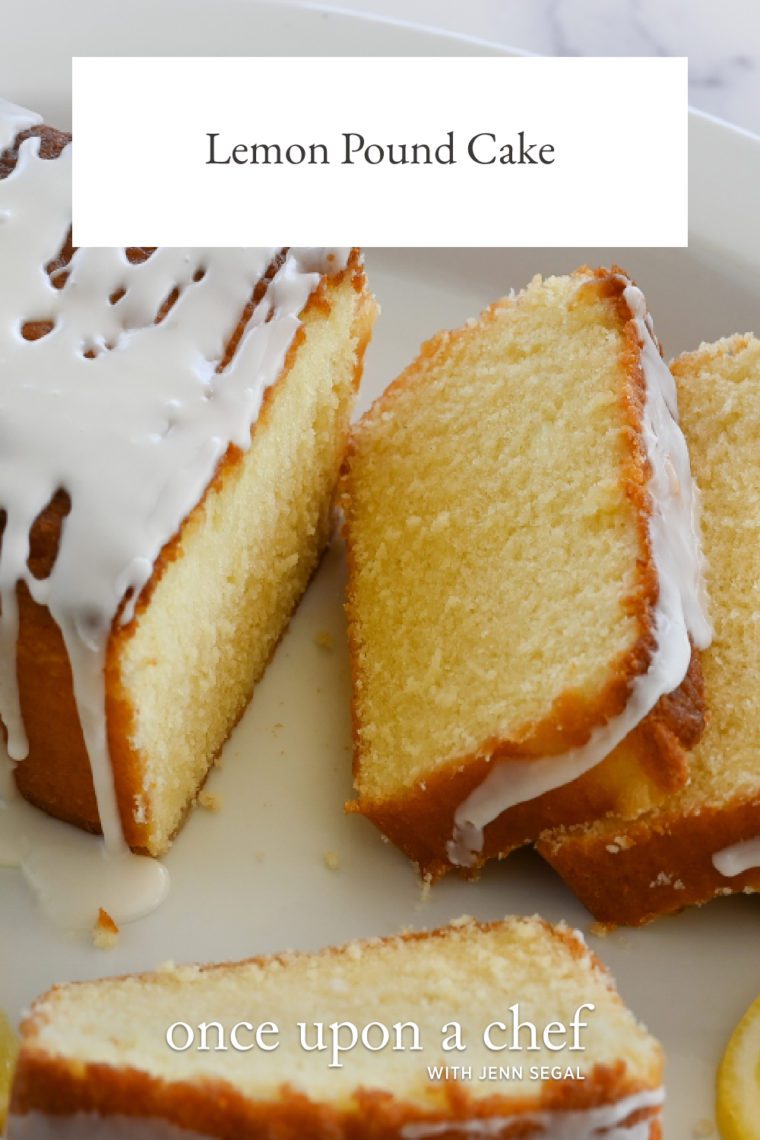
Excellent! I love this pound cake.
Could this be made in a small Bundt cake pan like the Nordic ware bunny pan for Easter?
Hi Mary, I’d be hesitant to recommend it, as the cake is prone to sticking.
I, too, wanted to replace one of the loafs with a 6-cup bundt cake. Deciding to take the risk of not being able to get it out of the pan, I thoroughly coated the Nordicware 6-cup Bundt pan with King Arthur Flour’s baking spray with flour. The cake came out of the pan very easily. No problem.
Another 5-star recipe from Jenn! I love the texture of this cake, and the flavor is just right: not too tart, not too sweet. I have tried other lemon pound cake recipes which also call for vanilla, in addition to the lemon juice and zest. This recipe makes me realize that vanilla should NOT be called for in a lemon pound cake — you get a brighter citrus flavor without.
I made the earlier Bundt pan version of this cake a while ago, and it turned out beautifully. Today I made the newer, 2-loaf version, and it turned out two delicious cakes. I’ll probably also do the Bundt pan version again (it looked so pretty on my jadeite cake stand!), but I love producing two cakes in one bake, one to keep and one to give away (or freeze).
Love the taste and texture of this cake! I was a little worried because I had just put the cakes in the oven when I realized I forgot to add the lemon juice and zest… I should be banned from the kitchen! I took them back out, poured the batter back into the bowl, and mixed the lemon in. So if this happens to anyone else, just know adding the lemon at the end of the recipe works just fine! It tasted fabulous!
Hi if I make one loaf ,shall I reduce all the ingredients to half?
Yep – enjoy!
Hi Jenn! If I want to make 1 loaf, how many eggs should I use? 1 or 2? Or 1.5?
Hi Sara, Use 1.5. Beat that second egg in a measuring cup, discard half of it, and use the remaining half. Enjoy!
Jenn, could you put a “tunnel” of purchased lemon curd in the center of the cake and then bake as directed? Would this alter the bake time or ratio of ingredients at all? I love the idea of lemon curd in there, but not sure if it’s advisable from a chef’s perspective. Please lmk your thoughts
Hi Karen, I think it will work. It shouldn’t impact the baking time much, but I’d keep an eye on it. I’d love to hear how it turns out!
Hi-If I make only one loaf, how do I just the timing? Thanks!
Hi Frederick, the bake time will be the same. Enjoy!
Has anyone tried this recipe with gluten free flour?
I have made this cake numerous times and it is ALWAYS a huge hit!
Hi Alice, a number of people have commented that they’ve made this with gluten-free flour and have been happy with the results (and so glad you like it)!
Hi Jenn! I am wanting to make this gluten free and also your lemon blueberry version. Do I use plain GF flour or self raising GF flour? Thank you! 🖤
Hi Peita I’d use an all purpose gluten-free flour. Many people have commented that they’ve had success with King Arthur’s Measure for Measure flour and Cup4Cup original flour blend. Hope you enjoy!
Just made this last night… delicious!! However, I couldn’t understand why it didn’t rise so much. I thought I did something wrong. And then it dawned on me and I looked up the recipe and I was using loaf pans that were larger than what you suggested. It still came out delicious and tasty, I will make that adjustment next time.
Super moist and fluffy was a big hit in my household, and the fact that it makes two loaves made me popular with my colleagues too!
Jenn I forgot to ask about the pan you’re using (it’s in the picture). Can you point me in the direction where to purchase them?
Thanks!
Lisa in Laton
Hi Lisa, they’re USA Pan loaf pans. ❤️